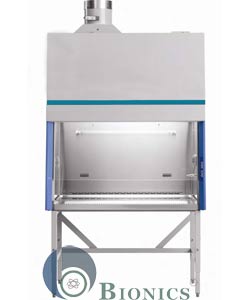What Might Be Next In The microbiological safety cabinet
What Might Be Next In The microbiological safety cabinet
Blog Article
Class 2 Biosafety Cabinets: Essential Equipment for Laboratory Safety and Microbiological Containment

Maintaining a safe lab environment is crucial in today’s advanced research and clinical setups. Whether it's conducting biological tests, diagnostics, or experiments with infectious agents, biosafety cabinets form the backbone of contamination control.
Among the available options, Class 2 Biosafety Cabinets stand out for their balanced protection. These units are crucial for working with moderate-risk organisms and sensitive samples.
Biosafety Cabinets – How They Work and Why They Matter
Biosafety cabinets are ventilated enclosures built to protect both users and biological materials. They use advanced filters to trap harmful particles before air re-enters the lab.
These units are generally classified into three main types: Class I, II, and III based on containment level. Among these, Class 2 cabinets are the most versatile and commonly used.
Defining Class 2 Biosafety Cabinets and Their Role
Class 2 Biosafety Cabinets are designed to safeguard three aspects: the operator, the sample, and the environment. They generate a vertical airflow that reduces turbulence and contamination.
Contaminated air is drawn into the cabinet and filtered through HEPA systems before recirculation or exhaust. These cabinets are ideal for work involving moderate-risk pathogens (BSL-2/3).
Essential Features of Class 2 Safety Cabinets
A Class 2 microbiological safety cabinet includes several advanced features such as:
• HEPA/ULPA filtration to trap microbes and particles
• Laminar airflow that minimises disruption and contamination
• Negative pressure barriers to prevent leakage
• Built-in UV sterilisation for decontaminating surfaces
• Quiet operation and ergonomic design for user comfort
• Front glass for full control and protection
These elements support lab workers in maintaining sterile working environments.
Applications in Research and Healthcare
Class 2 Biosafety Cabinets are key equipment in healthcare, molecular biology, and quality control. They are critical for DNA/RNA extraction, pathogen culture, and molecular assays.
Hospitals, research labs, and manufacturing units depend on these cabinets for contamination control.
Why Laboratories Prefer Class II Safety Cabinets
Using Class 2 cabinets offers significant improvements in contamination control and user safety:
• Reduces the risk of sample cross-contamination and error
• Shields operators from harmful aerosols and pathogens
• Improves environmental safety by filtering outgoing air
These cabinets help labs meet safety regulations while maintaining workflow.
Design and Compliance Standards
Top manufacturers ensure their cabinets meet certifications like NSF 49, EN 12469, and WHO recommendations. Class 2 units are sub-classified as A1, A2, B1, and B2—with each type offering different air handling systems.
• Type A2: Recirculates 70% and exhausts 30% of filtered air
• Type B2: Suited for labs dealing with toxic agents
Matching the cabinet type to your process is essential.
How to Select a Class 2 Safety Cabinet
Before purchasing, consider:
• Your application type (e.g., diagnostics, pharma, research)
• Available lab space and utility infrastructure
• Ease of use, energy efficiency, and upkeep
• Manufacturer reputation and post-sale support
Working with reliable manufacturers provides peace of mind and technical guidance.
Safe Setup and Operation of Class 2 Cabinets
For optimal results:
• Install the cabinet in a draft-free, low-traffic zone
• Get periodic validation from certified technicians
• Ensure operators follow best practices
Operational best practices include:
• Maintain biosafety gear protocols
• Minimise hand movements inside the cabinet
• Clean all contact points post-operation
• Treat UV usage as an overnight sterilisation Biosafety Cabinets method
Why Class 2 Cabinets Are a Must-Have in Labs
Class 2 biosafety cabinets are a cornerstone of any safe, efficient laboratory. They protect workers, secure samples, and copyright environmental standards.
From clinical research to vaccine development, Class II cabinets maintain sterility in sensitive procedures. When investing in a biosafety cabinet, opt for trusted brands that offer end-to-end service—because lab safety is non-negotiable. Report this page